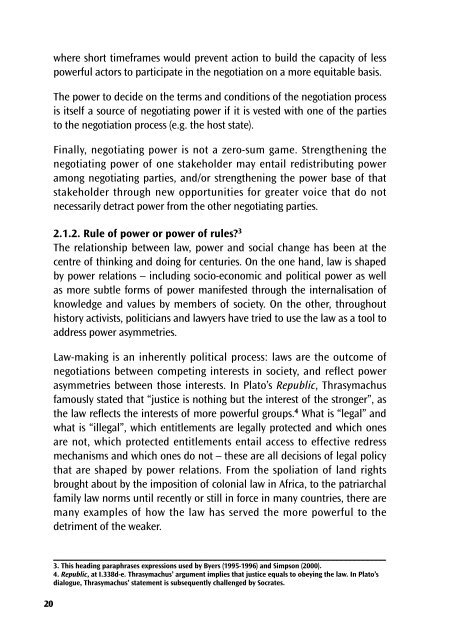Legal empowerment for local resource control
Legal empowerment for local resource control
Legal empowerment for local resource control
Create successful ePaper yourself
Turn your PDF publications into a flip-book with our unique Google optimized e-Paper software.
20<br />
where short timeframes would prevent action to build the capacity of less<br />
powerful actors to participate in the negotiation on a more equitable basis.<br />
The power to decide on the terms and conditions of the negotiation process<br />
is itself a source of negotiating power if it is vested with one of the parties<br />
to the negotiation process (e.g. the host state).<br />
Finally, negotiating power is not a zero-sum game. Strengthening the<br />
negotiating power of one stakeholder may entail redistributing power<br />
among negotiating parties, and/or strengthening the power base of that<br />
stakeholder through new opportunities <strong>for</strong> greater voice that do not<br />
necessarily detract power from the other negotiating parties.<br />
2.1.2. Rule of power or power of rules? 3<br />
The relationship between law, power and social change has been at the<br />
centre of thinking and doing <strong>for</strong> centuries. On the one hand, law is shaped<br />
by power relations – including socio-economic and political power as well<br />
as more subtle <strong>for</strong>ms of power manifested through the internalisation of<br />
knowledge and values by members of society. On the other, throughout<br />
history activists, politicians and lawyers have tried to use the law as a tool to<br />
address power asymmetries.<br />
Law-making is an inherently political process: laws are the outcome of<br />
negotiations between competing interests in society, and reflect power<br />
asymmetries between those interests. In Plato’s Republic, Thrasymachus<br />
famously stated that “justice is nothing but the interest of the stronger”, as<br />
the law reflects the interests of more powerful groups. 4 What is “legal” and<br />
what is “illegal”, which entitlements are legally protected and which ones<br />
are not, which protected entitlements entail access to effective redress<br />
mechanisms and which ones do not – these are all decisions of legal policy<br />
that are shaped by power relations. From the spoliation of land rights<br />
brought about by the imposition of colonial law in Africa, to the patriarchal<br />
family law norms until recently or still in <strong>for</strong>ce in many countries, there are<br />
many examples of how the law has served the more powerful to the<br />
detriment of the weaker.<br />
3. This heading paraphrases expressions used by Byers (1995-1996) and Simpson (2000).<br />
4. Republic, at I.338d-e. Thrasymachus’ argument implies that justice equals to obeying the law. In Plato’s<br />
dialogue, Thrasymachus’ statement is subsequently challenged by Socrates.

















